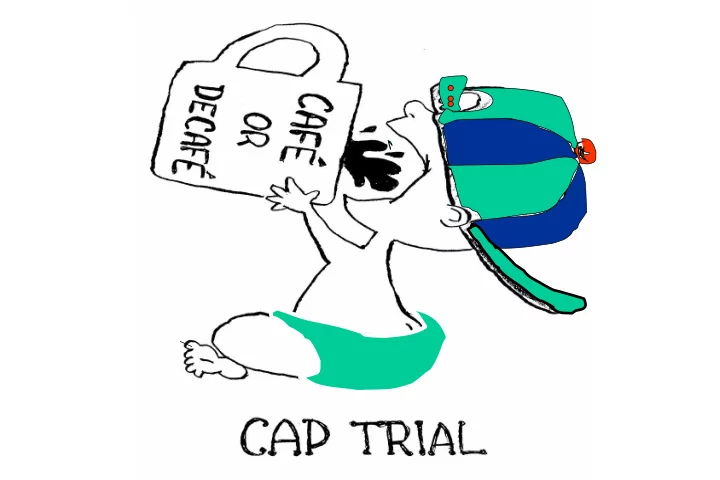

Dear Peter: Remember, we were going to create a shortlist of important questions for future joint trials? Well, here is one potential candidate: Barbara Schmidt; February 18, 1998
I was just browsing through the neonatal Cochrane website… I was absolutely horrified to see how few infants have ever been randomized to theophylline or caffeine, Barbara Schmidt; February 18, 1998
and that all we know is that these drugs reduce short-term apnea. I did not honestly know that the evidence was quite this flimsy. Barbara Schmidt; February 18, 1998
METHYLXANTHINE THERAPY IN PRETERM INFANTS Total no. of infants randomized to a 267 methylxanthine (17 trials) 14 Median no. per trial
METHYLXANTHINE THERAPY IN PRETERM INFANTS Duration of follow-up in17 RCTs 7 days Median
COCHRANE LIBRARY Methylxanthines reduce: RR (95% CI) • Apnea of prematurity 30/100 65/92 A • Mechanical ventilation 3/40 11/41 Favors xanthines Favors control Safety of xanthine therapy is uncertain Henderson-Smart DJ et al. In: The Cochrane Library, Issue 3, 2001.
Survival of 3 - 9 day old mice exposed to nitrogen Aminophylline Control 0 of 16 10 of 16 63% 0% Science 1978; 201: 649-51
MAIN STUDY QUESTION Among very-low-birth-weight infants P who are at risk of apnea of prematurity, does the use of caffeine I compared with placebo C O increase the risk of death or neurosensory disability T at a corrected age of 18 months
PATIENT ACCRUAL Europe Canada/US n=434 n=1052 Australia n=520
Short Term Outcomes of the Caffeine Trial Caffeine Placebo Odds Ratio Outcome n/N n/N (95% CI) BPD 350/963 447/954 Severe ROP 49/965 75/955* Brain injury 126/967 138/966 NEC 63/1006 67/1000 PDA drug Tx 293/1001 381/999 PDA surgery 45/1001 126/999 0.2 0.5 1 2 5 NEJM 2006;354:2112 and *2007;357:1893 Favours Caffeine Favours Placebo
18-Months Outcomes of the Caffeine Trial Caffeine Placebo Odds Ratio Outcome n/N n/N (95% CI) Death or disability 377/937 431/932 Death 62/974 63/970 Cerebral Palsy 40/909 66/901 Cognitive delay 293/867 329/858 Hearing loss 17/909 22/905 Blindness 6/911 8/905 0.2 0.5 1 2 5 N Engl J Med 2007;357:1893 Favours Caffeine Favours Placebo
2008 SCT/Imp /ImpACT ACT CLINI INICAL CAL TRIAL AL OF THE YEAR R A W ARD Long Term Effects of Caffeine for Apnea of Prematurity Trial PI: Barbara Schmidt, MD, MSc In recognition of a landmark randomized clinical trial to improve the lives of premature infants. Eleanor McFadden, MA Steven Goodman, MD, PhD President, Society for Clinical Trials Project ImpACT
Caffeine for Apnea of Prematurity (CAP)Trial: Outcomes at 5 Years Barbara Schmidt, Peter Anderson, Lex Doyle, Deborah Dewey, Ruth Grunau, Elizabeth Asztalos, Peter Davis, Win Tin, Diane Moddemann, Alfonso Solimano, Arne Ohlsson, Keith Barrington, Robin Roberts and The CAP Investigators
Primary Outcome at 5 Years Death or survival with disability in at least 1 of 6 domains: • Motor Function • General Health • Cognition • Hearing • Behaviour • Vision
Definitions of Disability • Gross Motor Function level > 2 • WPPSI III Full Scale IQ < 70 • CBCL Total Problem T score > 69 • O 2 , pos. pressure, frequent seizures, IV or tube feeding, or ICU admission • Serious hearing loss • Bilateral blindness
1932 Children in 5 Year Cohort 970 caffeine 962 placebo 833 807 (86%) (84%) Primary Outcome
Characteristics of 5 Year Cohort Infant Caffeine Placebo P-value 965 184 953 181 BW - g 0.17 27.4 1.8 27.3 1.8 GA - wks 0.16 Female 51% 46% 0.07 Antenatal 89% 88% 0.31 Steroids Singleton 71% 70% 0.45
Characteristics of 5 Year Cohort Mother Caffeine Placebo P-value Race 0.80 White 84% 82% Education 0.86 University 39% 38% Family 0.80 Single 9.9% 8.9% Employed 92% 94% 0.15
Death or Disability at 5 Years Caffeine Placebo 200 of 807 176 of 833 24.8% 21.1% OR = 0.82 95% CI 0.65-1.03 p = 0.09
Disabilities at 5 years Infant Caffeine Placebo P-value GMFCS>2 1.6% 2.7% 0.20 FSIQ<70 4.9% 5.1% 0.89 CBCL>69 5.4% 7.1% 0.18 Poor Health 4.0% 4.3% 0.75 Deafness 2.8% 3.2% 0.58 Blindness 0.9% 0.9% 0.94
Cognitive Impairment in the 5 Year Cohort Outcome Caffeine Placebo P-value MDI < 85 31% 37% 0.03 MDI < 70 12% 16% 0.02 FSIQ<70 4.9% 5.1% 0.89
Relationship between MDI at 18 months and gain in cognitive scores between 18 months and 5 years JAMA 2012;307:275
Conclusion I The rates of cognitive impairment were lower at 5 years than at 18 months and no longer reduced by neonatal caffeine therapy
Gross Motor Function (GMFCS) Level Caffeine Placebo P-value Normal 91% 86% 0.006 1 7.0% 10.1% 2 0.7% 1.0% 3 0.6% 0.6% 4 0.5% 1.3% 5 0.5% 0.8%
Definition of DCD in CAP Trial Movement ABC < 5 th Percentile Full scale IQ > 69 No cerebral palsy
Rates of DCD at 5 Years Caffeine Placebo 106 of 698 83 of 735 15.2% 11.3% OR = 0.70 95% CI 0.51-0.95 p =.024
Conclusion II Caffeine therapy for apnea of prematurity reduces the severity of motor disorders at 5 years
Evidence-based therapy of apnea Caffeine Temperature: Oxygen: Not too hot Not too high Not too cold Not too low Prone Nasal CPAP position
Recommend
More recommend